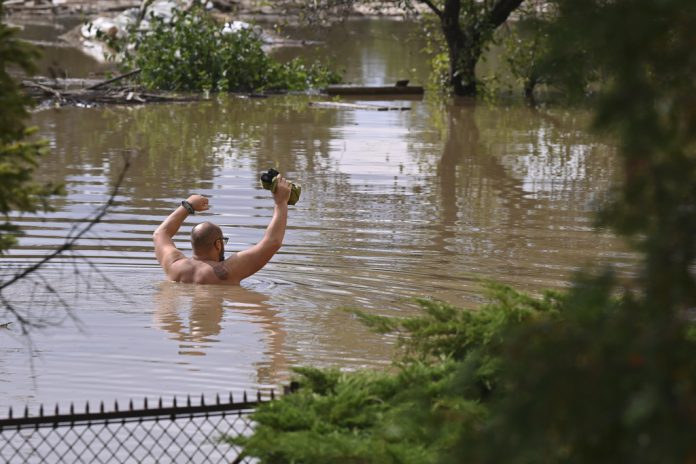PRAGUE (AP) — Another night of torrential rains pounding Central Europe forced massive evacuations in the hardest hit areas in the Czech Republic, where floods reached extreme levels on Sunday.
Meteorologists have warned the situation still might get worse as waters in most rivers are rising, the flood wave made its way through the country and more heavy rains could return overnight.
Authorities declared the highest flood warnings in almost 90 places across the country and in two northeastern regions that recorded the biggest rainfall in recent days, including the Jeseniky mountains near the Polish border.
In the city of Opava, up to 10,000 people out of a population of some 56,000 have been asked to leave their homes for higher ground. Rescuers used boats to transport people to safety in a neighborhood flooded by the raging Opava River.
“There’s no reason to wait,” Mayor Tomáš Navrátil told the Czech public radio. He said the situation was worse than during the last devastating floods in 1997, known as the “flood of the century.”
“We have to focus on saving lives,” Prime Minister Petr Fiala told the Czech public television Sunday. His government was to possibly meet Monday to assess the damages.
At least four missing and villages cut off
Thousands of others also were evacuated in the towns of Krnov and Cesky Tesin. The Oder River that flows to Poland was expected to reach extreme levels in the city of Ostrava and later in Bohumin.
Towns and villages in the Jeseniky mountains, including the local center of Jesenik, were inundated and isolated by raging waters that turned roads into rivers. The military sent a helicopter to help with evacuations.
Four people who were swept away by waters were missing, police said.
About 260,000 households were without power Sunday morning in the entire country while traffic was halted on many roads, including the major D1 highway.
A firefighter dies as Lower Austria declared a disaster zone
A firefighter died after “slipping on stairs” while pumping out a flooded basement in the town of Tulln, the head of the fire department of Lower Austria Dietmar Fahrafellner told reporters on Sunday.
Authorities declared the entire state of Lower Austria a disaster zone. The situation remains tense, especially at the water reservoir of Ottenstein, which is expected to reach its maximum capacity on Sunday.
Romania reports another flooding victim
Romanian authorities said Sunday that another person had died in the hard-hit eastern county of Galati after four were reported dead there a day before following unprecedented rain.
Dramatic flooding in Poland
In Poland, one person was presumed dead in floods in the southwest, Prime Minister Donald Tusk said Sunday.
Tusk said the situation was “dramatic” around the town of Klodzko, with some 25,000 residents, located in a valley in the Sudetes mountains near the border with the Czech Republic.
In Glucholazy, rising waters overflowed a river embankment and flooded streets and houses. Mayor Paweł Szymkowicz said, “we are drowning” and appealed to residents to evacuate to high ground.
Energy supplies and communications were cut off in some flooded areas and regions may resort to using the satellite-based Starlink service, Tusk said.
Several Central European nations have been hit by severe flooding, including Romania, Austria, Germany, Slovakia and Hungary, as a result of a low-pressure system from northern Italy dumping heavy rainfall in the wide region.
The weather change arrived following a hot start to September in the region. Scientists have documented Earth’s hottest summer, breaking a record set just a year ago.
A hotter atmosphere, driven by human-caused climate change, can lead to more intense rainfall.
___
Associated Press writer Monika Scislowska in Warsaw, Poland, video journalist Philipp-Moritz Jenne in Vienna and Stephen McGrath in Bucharest, Romania, contributed to this report.
Source: post





